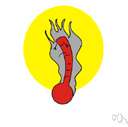ThesaurusAntonymsRelated WordsSynonymsLegend:
| Noun | 1. |  malignant hyperthermia - hereditary condition in which certain anesthetics (e.g., halothane) cause high body temperatures and muscle rigidity malignant hyperthermia - hereditary condition in which certain anesthetics (e.g., halothane) cause high body temperatures and muscle rigidityautosomal dominant disease, autosomal dominant disorder - a disease caused by a dominant mutant gene on an autosome |
Based on WordNet 3.0, Farlex clipart collection. © 2003-2012 Princeton University, Farlex Inc.